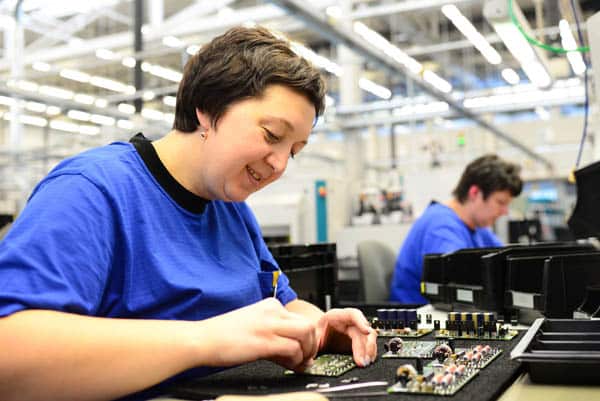What is an assembly line and why is it a significant innovation in history?
The assembly line was a major technological advance that changed the way products were made and had a significant impact on society.
An assembly line is a production process in which individual parts (usually interchangeable parts) are added to a product in a sequential manner to create a finished product.
The assembly line was first introduced by Henry Ford in 1913 and has since become the standard manufacturing process for many industries. Its main advantages are its efficiency and consistency; with an assembly line, each worker is assigned a specific task to do over and over again, which leads to faster production times and fewer mistakes.
The Assembly Line was a new way of manufacturing that greatly increased production. The appeal of the assembly line was that it reduced the cost of production while also increasing the quality of the final product. This new method of production had a profound effect on society. Factory workers were now able to produce more goods in a shorter amount of time. This led to businesses being able to sell their products for less, which increased consumption and helped to grow the economy. The assembly line also had an impact on the way products were designed. In order to be produced efficiently, items now had to be standardized, which resulted in mass-produced goods that were more uniform in appearance.
What is an assembly worker?
Assembly workers work on a production line and specialize in putting together parts to create a final product. Assembly workers have a myriad of different titles, ranging from assembler to assembly line processor, assembly production specialist or production line specialist. Regardless of the title used, all assemblers are responsible for overseeing and completing the assembly of products at the end of a production line.
Assembly jobs are typically based in a factory setting, with assemblers working alongside production line workers, collecting the parts from any given station, and putting them together before passing their completed work on to the next station. Some assembly jobs are based in warehouses or outdoor environments where there is more space and less structure, facilitating assembly of certain products.
What skills do assembly workers need?
Assembly workers need to have a great attention to detail and be able to handle a fast-paced working environment. Precision is key, but so is sticking to deadlines, and assembly workers need to be able to find an effective balance between speed and accuracy to excel at their jobs. Assemblers require a high level of dexterity, as they typically work with their hands to put parts together.

Assembly jobs are often very active – they involve a lot of walking, lifting, pulling, pushing, and standing for long hours, depending on the product in question. Regardless of what the product is, however, there is almost often a lot of movement involved, meaning that assembly workers need to have both stamina and physical strength to thrive at their job.
Working as an assembler also requires specialized skills, such as being able to read blueprints or schematic diagrams, operate and troubleshoot machinery, power tools or even programmed robotics, and be able to execute mathematical computations to complete their tasks.
Safety first
Assembly specialists are frequently working in semi-hazardous conditions and are required to wear safety equipment and follow strict safety procedures. The ability to adhere to safety protocol is one of the most important aspects of working in the manufacturing industry. It’s essential to maintaining a secure working environment, minimizing accidents or injury, and improving the efficiency of the line.
Do I need a degree to work in assembly?
Most assembly positions require that candidates have a minimum of a high school degree or equivalent, however there are many assembly jobs that also require a technical degree or specialized training. While there are plenty of entry-level assembly jobs, putting together simple products, specialized products such as vehicle parts, medical equipment or electronics are more likely to require that an applicant have previous assembly experience or specialized certifications to get hired.

As you might expect, entry level assemblers will start at a lower pay grade than those with more specialized skills, however it’s possible to gain certifications – either independently or with the support of your current employer – so that you can work with electrical wiring, soldering, or welding, hazardous materials or in other, higher-paid assembly jobs.
While there is no across-the-board training required for assembly jobs, each position is likely to provide specialized training related to that company’s product after you have been hired. You’ll learn how to assemble specific products on your production line, as well as how to use tools and machinery according to the company’s policy. You’ll also be trained in safety procedures and corporate culture.
Training could last a few weeks, and may be more formal or informal, depending on the company that you’re working with.
Is assembly work a good job?
As we mentioned, assembly jobs range from simple to more complex, so if you’re looking for a career with room for growth, assembling might be perfect for you. If you have already worked in a production capacity or in more simple assembly jobs, you might be able to get an apprenticeship within your company to take your skills to the next level, and you to a higher pay grade.
You can also independently choose to take specialized courses that will increase your paygrade or allow you to look for more specialized positions. These courses include things we mentioned previously such as Hazardous Materials Handling, Electrical Wiring, Industry Safety Standards, Soldering or a Forklift Operator’s License.
What are assembly line workers wages?

The median annual wage for assemblers and fabricators was $37,170 in 2021 according to the Bureau of Labor Statistics. Salary.com says the average hourly wage for an Assembly Line Worker in the United States is $19, but the salary range typically falls between $17 and $22. The pay difference between different assembly jobs doesn’t just relate to the item being assembled, but also to a candidate’s prior experience and specialized certification. Some companies may even prefer that a candidate have five years or more on a production line prior to taking any specialized certification courses to ensure that the employee in question has the necessary physical and soft skills to thrive in a manufacturing environment.
References:








